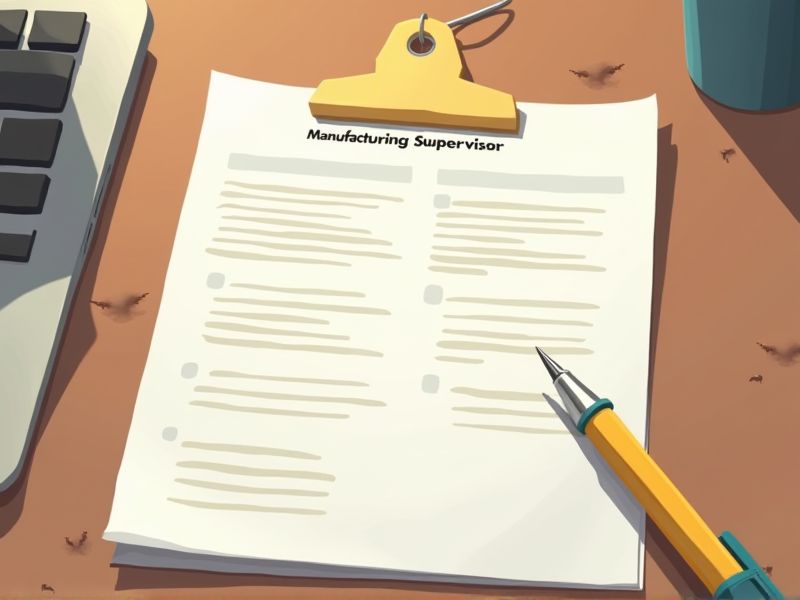
Manufacturing Supervisors play a critical role in ensuring the efficient operation of production lines, requiring them to possess a range of technical and leadership skills. Certifications equip them with the necessary knowledge to enhance productivity, ensure safety compliance, and maintain quality standards. As manufacturing environments increasingly incorporate advanced technologies, staying certified allows supervisors to keep pace with industry advancements. Here are some important certifications you may need for a Manufacturing Supervisor.
Lean Six Sigma Green Belt Certification
Manufacturing supervisors often face challenges in process efficiency and quality control; the Lean Six Sigma Green Belt Certification equips them with data-driven tools for these areas. The training enhances problem-solving skills, allowing supervisors to identify waste and implement effective solutions. Certified supervisors are more adept at leading projects that align with strategic goals, fostering continual improvement. With these competencies, organizations often see increased productivity and reduced operational costs, directly impacting the bottom line.
Lean Six Sigma Black Belt Certification
Lean Six Sigma Black Belt Certification enhances problem-solving skills, which improves productivity and efficiency in manufacturing processes. The certification equips a supervisor with the ability to identify and eliminate waste, reducing operational costs. With advanced knowledge in quality management, a certified professional can lead teams in implementing effective process improvements. The certification provides a competitive edge, which, in turn, boosts career advancement opportunities in the manufacturing sector.
OSHA 30-Hour Certification
Manufacturing supervisors often oversee hazardous environments, so possessing OSHA 30-Hour Certification enhances workplace safety by providing critical knowledge of regulations and best practices. This certification helps mitigate risks, resulting in reduced accident rates and improved overall productivity. Compliance with OSHA standards is crucial, as it aids in avoiding costly fines and legal issues. Furthermore, a certified supervisor can boost employee morale by demonstrating a commitment to safety, leading to a more engaged and efficient workforce.
Certified Production Supervisor (CPS)
The Certified Production Supervisor (CPS) certification equips manufacturing supervisors with essential skills to improve production efficiency, leading to increased productivity. Enhanced expertise from CPS helps in effectively managing teams, which reduces error rates and operational bottlenecks. Knowledge from the certification allows supervisors to implement industry best practices, driving quality improvements and consistency. Supervisors with CPS credentials are better prepared to handle compliance and safety standards, minimizing workplace accidents and associated costs.
Certified Manufacturing Engineer (CMfgE)
A Certified Manufacturing Engineer (CMfgE) brings a deep understanding of engineering principles, directly enhancing a Manufacturing Supervisor's ability to optimize production processes. This certification ensures the Supervisor is well-versed in the latest industry standards and technologies, resulting in improved efficiency and productivity. By possessing CMfgE credentials, the Supervisor can effectively implement lean manufacturing techniques, reducing waste and costs. The engineering certification strengthens problem-solving skills, enabling the Supervisor to address complex manufacturing challenges swiftly.
ISO 9001:2015 Lead Auditor Certification
Manufacturing supervisors with ISO 9001:2015 Lead Auditor Certification gain enhanced skills in quality management systems, leading to improved process efficiency and product quality. This certification equips them to better identify and rectify non-conformities, reducing defects in production. With this expertise, they foster a culture of continuous improvement and standard compliance within the manufacturing team. Businesses benefit through optimized operations, increased customer satisfaction, and a boost in competitive advantage.
APICS Certified in Production and Inventory Management (CPIM)
Manufacturing supervisors with an APICS Certified in Production and Inventory Management (CPIM) credential possess a deep understanding of production planning and inventory control, leading to more efficient operations. This certification enhances decision-making skills, often resulting in cost reductions and increased productivity within manufacturing processes. CPIM-certified supervisors are better equipped to implement standardized best practices, which can lower errors and improve quality management. Companies that employ CPIM-certified supervisors often experience increased competitive advantage due to streamlined supply chain and operations management.
APICS Certified Supply Chain Professional (CSCP)
The APICS Certified Supply Chain Professional (CSCP) certification provides manufacturing supervisors with a comprehensive understanding of supply chain management practices. This deeper knowledge often leads to streamlined operations and improved efficiency in the manufacturing process. Supervisors with a CSCP certification are better equipped to anticipate and mitigate disruptions within the supply chain, enhancing production stability. The insights gained from the CSCP certification can foster innovative approaches to reduce costs and increase competitiveness in the market.
Project Management Professional (PMP) Certification
Achieving a PMP certification equips manufacturing supervisors with structured methodologies to enhance project efficiency and mitigate risks. This certification demonstrates a supervisor's ability to align manufacturing projects with strategic business goals, ensuring optimal resource utilization and cost control. It also fosters improved communication and leadership skills, enabling managers to effectively guide teams through complex production challenges. In an industry driven by deadlines and quality benchmarks, a PMP certification serves as a testament to a supervisor's capability to manage projects within scope, time, and budget constraints.
Certified Quality Engineer (CQE)
A CQE ensures adherence to stringent quality standards within manufacturing processes, leading to increased product reliability. Their expertise aids in identifying and rectifying process inefficiencies, resulting in cost reductions and improved profitability. The skills of a CQE facilitate effective root cause analysis, minimizing the recurrence of defects and enhancing overall production quality. Integration of a CQE in supervisory roles supports regulatory compliance and boosts customer satisfaction through consistent product delivery.
Summary
When you, as a Manufacturing Supervisor, obtain certifications, your expertise and credibility in the industry increase significantly. This development can lead to enhanced operational efficiency, as you apply advanced techniques and knowledge. Teams under your supervision are likely to experience improved motivation and productivity due to your leadership and competency. Your career trajectory may also accelerate, with potential for promotions and salary increases reflecting your certified skills.
